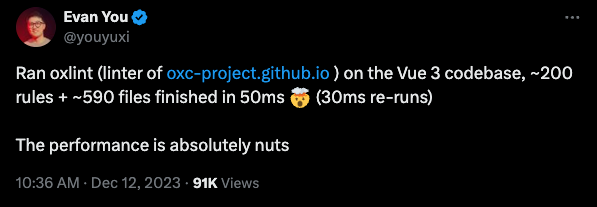This content originally appeared on Bits and Pieces - Medium and was authored by Ashan Fernando
“Age of Oxidation” sets the stage for a faster and more efficient JavaScript landscape.

For almost three decades, JavaScript has been the backbone of web development. Yet, as applications grow more complex, developers find new ways to push JavaScript beyond its original limits. Surprisingly, the answer lies in reducing our reliance on JavaScript itself.
At the same time, a wave of innovation is gradually transforming the JavaScript ecosystem. Rust, a language renowned for its speed and safety, is becoming the norm to rewrite existing JavaScript tools and infrastructure.
This trend, known as the “Age of Oxidation” sets the stage for a faster and more efficient JavaScript landscape.
The Journey of JavaScript
JavaScript’s evolution has gone through multiple revolutions, each marking a pivotal shift in how we build the web.
1. Creating the Dynamic Web
In the mid-90s, JavaScript was the scrappy underdog of the web.
Back then, it was all about adding life to static HTML pages
Competing against giants like Java applets and Flash, JavaScript’s simplicity and versatility won over developers, eventually making it the go-to choice for front-end development. It turned static documents into interactive experiences, laying the groundwork for the web as we know it.
2. JavaScript Takes Over
The early 2010 was a renaissance period for JavaScript. This was when JavaScript grew beyond leaps and bounds. The introduction of ECMAScript 6 (ES6) brought powerful new features, and libraries and frameworks like React, Angular, and Vue transformed how developers built web applications. But the real game-changer was Node.js.
JavaScript was suddenly everywhere — servers, desktops, and even IoT devices- becoming a universal language.
3. The Age of Oxidation
Today, we’re witnessing a new chapter: the Age of Oxidation.
JavaScript tools built in the past are now hitting performance ceilings.
Rust, known for its speed and memory safety, is used to rewrite key JavaScript tools, breathing new life into the ecosystem. This transformation is making the JavaScript landscape faster, more secure, and more robust, preparing it for the demands of modern development.
The journey of JavaScript is far from over. Each era has brought new capabilities, and as we move into the Age of Oxidation, the language continues to evolve, driving innovation and empowering developers worldwide.
Rewriting the Tools: Rust Takes the Lead
The shift began quietly but has quickly gained momentum. One of the first significant milestones was the launch of Parcel 2, a blazing-fast JavaScript bundler now powered by Rust. Its speed stunned developers, reducing build times from minutes to seconds.
Inspired by this success, other tools followed, embracing Rust to push the boundaries of what JavaScript could achieve.

- Rome is a JavaScript toolchain designed to unify linting, formatting, and testing, which initially struggled with performance issues. Rewriting core components in Rust resulted in a dramatic speed increase, making it 10 times faster than its JavaScript-based predecessor. This shift improved performance, making the toolchain more reliable and easier to maintain.
- SWC is a Rust-based JavaScript and TypeScript compiler that emerged as a game-changer. It offers a drop-in replacement for Babel, reducing compilation times by up to 80%.
Developers working on large projects, like at Airbnb, reported that build times for their complex TypeScript projects dropped from over 30 minutes to just a few minutes with SWC, allowing for a more efficient development process.
- Tauri is A lightweight alternative to Electron for building desktop apps using web technologies, leveraging Rust for superior performance, security, and flexibility.
- Turbopack was introduced as a new, improved bundler written in Rust, boasting up to 700 times faster performance than Webpack.
- Rspack is a Rust-based bundler that offers a significant performance boost over traditional bundlers like Webpack. It’s particularly effective in composable architectures, where fast, incremental builds are crucial.
- Oxlint is a Rust-based JavaScript linter 50 to 100 times faster than ESLint. It has significantly improved performance for large-scale applications, like the Vue 3 codebase, where linting time dropped to 50ms, according to its creator, Evan You.

Why Rust?
Why is Rust the chosen language for this transformation? It boils down to its ability to deliver speed and safety. Rust compiles to native code, enabling tools to run at near hardware speeds, something JavaScript’s JIT (Just-In-Time) compilation cannot match. Moreover, Rust’s strict memory management prevents many common errors, such as null pointer exceptions and data races, which are frequent pitfalls in JavaScript.
Embracing the Future: What Can Developers Do?
Rust-based tools offer significant performance gains and a more reliable development experience for JavaScript development. A curated list of such tools is available on repositories like awesome-rust-js, where you can explore the best Rust-based solutions for JavaScript development.
The Age of Oxidation is more than just a trend; it’s the future of JavaScript development. As more tools are rewritten in Rust, we’ll see the JavaScript ecosystem becoming faster, safer, and more reliable.
The partnership between JavaScript and Rust represents a perfect synergy: JavaScript’s ubiquity and flexibility paired with Rust’s performance and safety.
The Rise of Composability: Modularizing Your Codebase
While Rust addresses performance issues, composability tackles scaling and maintaining large codebases. Composability means breaking down your application into smaller, self-contained components that can be developed and maintained independently. This modular approach makes managing your codebase easier and fosters better team collaboration.
Bit supports Rspack (Rust-based bundler)
Bit Platform implements composability in JavaScript projects. It allows us to seamlessly isolate, develop, and share components across different projects.
This is especially powerful when combined with tools like Rspack, enabling it to build a fast, efficient, and composable application.
Building a Fast and Efficient Composable App using React and Rspack
This is a clear sign that modern platforms and tooling have also started to support Rust base bundlers and compilers to increase their performance and overcome the limitations with Tools written in JavaScript.
Conclusion
In conclusion, JavaScript isn’t going anywhere. It’s just getting a high-octane boost from Rust, transforming into a language that can handle the challenges of modern web development with unprecedented speed and efficiency.
So, let’s embrace this exciting new chapter in JavaScript’s story and build a faster, more powerful web together!
I hope this article showed what Rust-based tooling is doing in the JavaScript ecosystem. If you have any suggestions, please mention in the comments below.
Learn More
- Make Instant Package Updates and Test Impact on Dependent Projects
- Measuring Performance of Different JavaScript Loop Types
- Enhancing Developer Experience (DX) using Components
- How “Code Reuse” Affects Different Architecture Styles
Rust Turbocharges JavaScript: A New Era of Speed and Efficiency was originally published in Bits and Pieces on Medium, where people are continuing the conversation by highlighting and responding to this story.
This content originally appeared on Bits and Pieces - Medium and was authored by Ashan Fernando
Ashan Fernando | Sciencx (2024-09-20T10:08:33+00:00) Rust Turbocharges JavaScript: A New Era of Speed and Efficiency. Retrieved from https://www.scien.cx/2024/09/20/rust-turbocharges-javascript-a-new-era-of-speed-and-efficiency/
Please log in to upload a file.
There are no updates yet.
Click the Upload button above to add an update.
